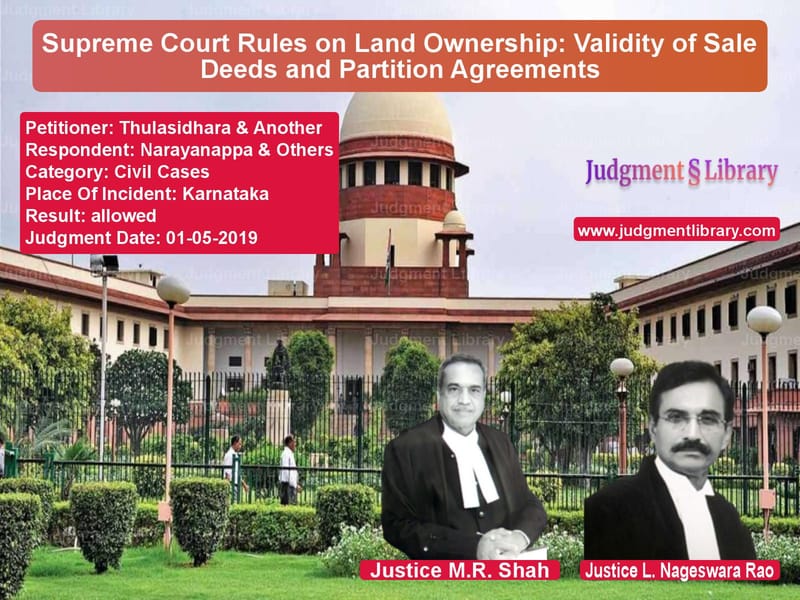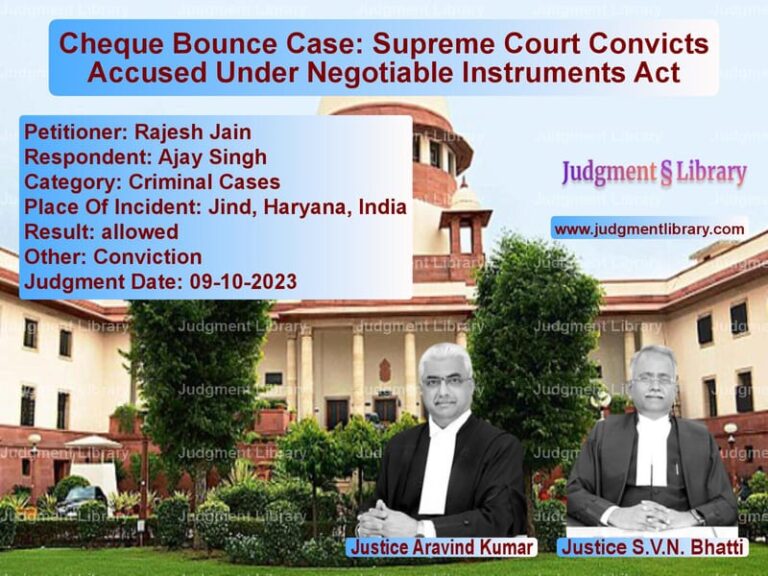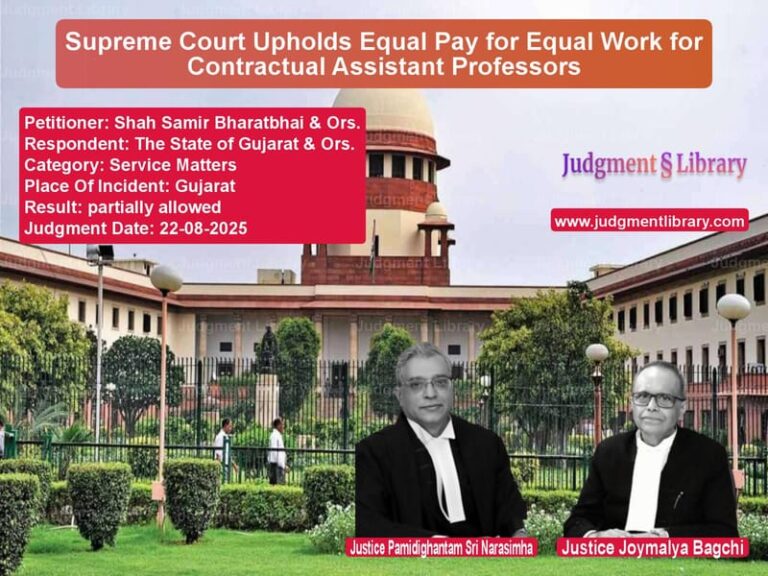Supreme Court Rules on Land Ownership: Validity of Sale Deeds and Partition Agreements
The Supreme Court of India recently ruled on a crucial land dispute in the case of Thulasidhara & Another vs. Narayanappa & Others. This case involved significant legal issues regarding land ownership, the validity of sale deeds, and the impact of unregistered partition agreements on property rights.
The case arose from a long-standing dispute where the plaintiff (respondent) sought to claim ownership over a property based on a registered sale deed. On the other hand, the defendants (appellants) contended that the land in question was a part of joint family property and had been subject to an unregistered partition agreement. The lower courts ruled in favor of the defendants, but the High Court overturned these decisions. Eventually, the Supreme Court reinstated the lower court’s findings, ruling in favor of the appellants.
Background of the Case
The dispute pertained to a piece of land located in Karnataka, over which both parties claimed ownership. The respondent (original plaintiff) filed a civil suit seeking:
- A declaration that he was the rightful owner of the suit property.
- A permanent injunction to restrain the defendants from interfering with his possession.
The plaintiff based his claim on a registered sale deed, which he alleged conferred upon him absolute ownership. However, the defendants argued that the land was joint family property and had been subject to a partition agreement in 1971, which the plaintiff had conveniently ignored. Furthermore, they contended that the sale deed relied upon by the plaintiff was a mere nominal document executed for security purposes and was never intended to transfer ownership.
Proceedings Before the Trial Court and Appellate Court
The case was initially heard by the Trial Court, which dismissed the plaintiff’s suit after finding that:
- The suit property had been part of a family partition agreement dated 23.04.1971 (Exhibit D4).
- The sale deed (Exhibit P1) relied upon by the plaintiff was nominal and had not been acted upon.
- The plaintiff had not been in possession of the land in a manner that could be considered legitimate ownership.
The First Appellate Court upheld the Trial Court’s decision, reinforcing the view that the sale deed was not an outright transfer of ownership and that the family partition agreement had determined the division of property.
High Court’s Reversal
Upon appeal, the High Court ruled in favor of the plaintiff, overturning the concurrent findings of the Trial Court and the First Appellate Court. The High Court held that:
- The registered sale deed (Exhibit P1) was an absolute transfer of ownership.
- The partition agreement (Exhibit D4) was unregistered and, therefore, inadmissible as evidence.
- The defendants had not challenged the sale deed in a separate suit, making their objections invalid.
Arguments by the Appellants (Defendants)
The appellants, represented by Ms. Kiran Suri, challenged the High Court’s ruling on the following grounds:
- The High Court had exceeded its jurisdiction under Section 100 of the Code of Civil Procedure (CPC) by interfering with the factual findings of the lower courts.
- The sale deed (Exhibit P1) was a nominal document and was never intended to effectuate an actual sale.
- The partition agreement (Exhibit D4), although unregistered, should still be considered as evidence of family settlement.
- Legal precedents allow unregistered family arrangements to be used as corroborative evidence.
Arguments by the Respondents (Plaintiff)
The respondents, represented by Ms. K.V. Bharathi, argued that:
- The sale deed (Exhibit P1) was duly registered and, therefore, conferred absolute ownership on the plaintiff.
- The partition document (Exhibit D4) was unregistered and hence inadmissible under the Registration Act.
- The High Court was justified in overturning the lower courts’ decisions since they had ignored the legal effect of the registered sale deed.
- The defendants never filed a counterclaim challenging the validity of the sale deed.
Supreme Court’s Judgment
The Supreme Court reversed the High Court’s decision and reinstated the rulings of the Trial Court and First Appellate Court, dismissing the plaintiff’s claim.
Key Observations by the Supreme Court
- The High Court erred by interfering with concurrent factual findings of the lower courts, which is not permissible under Section 100 of the CPC.
- The jurisdiction of the High Court in a second appeal is limited to substantial questions of law, and no such question was present in this case.
- The sale deed relied upon by the plaintiff was a nominal document and had not been acted upon.
- Even though the partition agreement was unregistered, it could still be considered as evidence under the doctrine of estoppel.
- The plaintiff’s failure to establish possession and ownership under the sale deed justified the lower courts’ dismissal of the suit.
Legal Implications of the Ruling
This judgment reinforces several critical legal principles:
- Limited Scope of Second Appeals: High Courts cannot interfere with factual findings unless a substantial question of law arises.
- Unregistered Family Settlements: Even if not registered, family settlements can be used as corroborative evidence.
- Nominal Sale Deeds: If a sale deed is executed as security or lacks genuine consideration, it may not confer ownership rights.
- Burden of Proof: The plaintiff must establish actual possession and ownership, not just rely on a registered document.
Conclusion
The Supreme Court’s decision in this case sets a strong precedent in property law by reaffirming that registered documents do not automatically confer ownership if there is substantial evidence to the contrary. The ruling also underscores that unregistered family arrangements, while not legally binding, can still hold evidentiary value in determining the rightful ownership of disputed property.
By reinstating the lower court’s dismissal of the suit, the Supreme Court has upheld the principle that judicial interference must be limited in second appeals and that family settlements, even if unregistered, can carry weight under specific legal doctrines.
Petitioner Name: Thulasidhara & Another.Respondent Name: Narayanappa & Others.Judgment By: Justice M.R. Shah, Justice L. Nageswara Rao.Place Of Incident: Karnataka.Judgment Date: 01-05-2019.
Don’t miss out on the full details! Download the complete judgment in PDF format below and gain valuable insights instantly!
Download Judgment: Thulasidhara & Anoth vs Narayanappa & Others Supreme Court of India Judgment Dated 01-05-2019.pdf
Direct Downlaod Judgment: Direct downlaod this Judgment
See all petitions in Property Disputes
See all petitions in Succession and Wills
See all petitions in Landlord-Tenant Disputes
See all petitions in Judgment by Mukeshkumar Rasikbhai Shah
See all petitions in Judgment by L. Nageswara Rao
See all petitions in allowed
See all petitions in supreme court of India judgments May 2019
See all petitions in 2019 judgments
See all posts in Civil Cases Category
See all allowed petitions in Civil Cases Category
See all Dismissed petitions in Civil Cases Category
See all partially allowed petitions in Civil Cases Category







